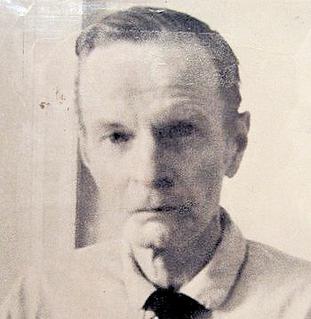
Cornell George Hopley Woolrich was an American novelist and short story writer. He sometimes used the pseudonyms William Irish and George Hopley.

Thriller is a genre of fiction with numerous, often overlapping, subgenres, including crime, horror, and detective fiction. Thrillers are characterized and defined by the moods they elicit, giving their audiences heightened feelings of suspense, excitement, surprise, anticipation and anxiety. This genre is well suited to film and television.

Fear in the Night is an American 1947 film noir crime film directed by Maxwell Shane, starring Paul Kelly and DeForest Kelley. It is based on the Cornell Woolrich story "And So to Death". Woolrich is credited under pen name William Irish. The film was remade by the same director in 1956 with the title Nightmare this time starring Edward G. Robinson playing the cop and Kevin McCarthy.
Black Angel is a 1946 American film noir directed as his final feature by Roy William Neill and starring Dan Duryea, June Vincent and Peter Lorre. Produced by Universal Pictures, it is set in Los Angeles and broadly adapted from the 1943 novel of the same title by Cornell Woolrich.

Crime SuspenStories was a bi-monthly anthology crime comic published by EC Comics in the early 1950s. The title first arrived on newsstands with its October/November 1950 issue and ceased publication with its February/March 1955 issue, producing a total of 27 issues. Years after its demise, the title was reprinted in its entirety, and four stories were adapted for television in the HBO's Tales From The Crypt.
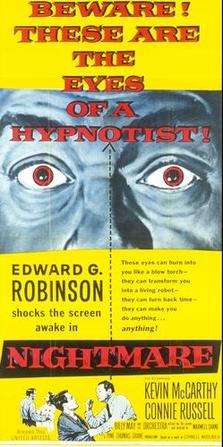
Nightmare is a 1956 American film noir crime film directed by Maxwell Shane and starring Edward G. Robinson, Kevin McCarthy and Connie Russell.

The Chase is a 1946 American film noir directed by Arthur Ripley. The screenplay by Philip Yordan is based on Cornell Woolrich's 1944 novel The Black Path of Fear. It stars Robert Cummings as Chuck Scott, a veteran who suffers from hallucinations. When he returns a lost wallet to violent mobster Eddie Roman, Eddie offers to hire him as a chauffeur. Chuck becomes mixed up in a plot to help Eddie's wife Lorna run off to Havana to escape her cruel husband.

The Window is a 1949 American black-and-white film noir, based on the short story "The Boy Cried Murder" by Cornell Woolrich, about a lying boy who witnesses a killing but is not believed. The film, a critical success that was shot on location in New York City, was produced by Frederic Ullman Jr. for $210,000 but earned much more, making it a box-office hit for RKO Pictures. The film was directed by Ted Tetzlaff, who worked as a cinematographer on over 100 films, including another successful suspense film, Alfred Hitchcock's Notorious (1946). For his performances in this film and in So Dear to My Heart, Bobby Driscoll was presented with a miniature Oscar statuette as the outstanding juvenile actor of 1949 at the 1950 Academy Awards ceremony.

The Bride Wore Black is a 1940 American novel written by Cornell Woolrich, initially published under the pseudonym William Irish. Although it was Woolrich's seventh published novel, it was the first in the noir/pulp style for which he would become known, his previous novels having been Jazz Age fiction about the wealthy and privileged.
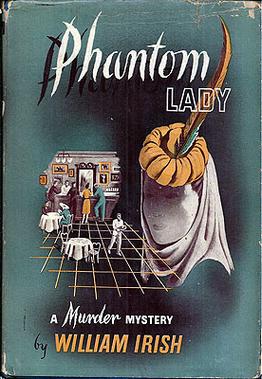
Phantom Lady is a 1942 crime novel written by American author Cornell Woolrich under the pseudonym "William Irish". It is the first novel Woolrich published under the William Irish pseudonym.

Suspense is an American television anthology series that ran on CBS Television from 1949 to 1954. It was adapted from the radio program of the same name which ran from 1942 to 1962.

Fall Guy is a 1947 American crime film noir directed by Reginald Le Borg. The drama features Leo Penn, Robert Armstrong and Teala Loring. The film is based on Cornell Woolrich's short story, "Cocaine."
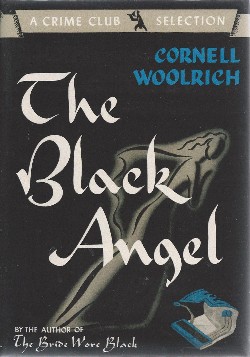
The Black Angel is a 1943 novel by Cornell Woolrich, which was based on two of his own short stories, Murder in Wax and Face Work. Woolrich had reworked many of his short stories into full-length novels, including Black Angel.
Stephen Gould Fisher was an American author best known for his pulp stories, novels and screenplays. He is one of the few pulp authors to go on to enjoy success as both an author in "slick" magazines, such as the Saturday Evening Post, and as an in-demand writer in Hollywood.

I Wouldn't Be in Your Shoes is a 1948 American film noir directed by William Nigh, starring Don Castle and Elyse Knox. It was based on a novel of the same name by Cornell Woolrich with a screenplay by fellow pulp writer Steve Fisher.
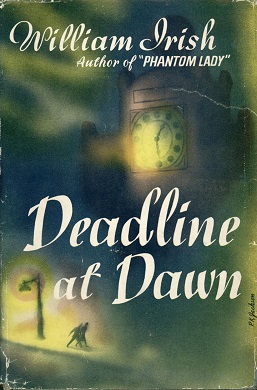
Deadline at Dawn is a 1944 novel by American crime writer Cornell Woolrich under the pseudonym William Irish. It was adapted into a film of the same name in 1946 starring Susan Hayward.

After-Dinner Story is a 1944 short story collection by American crime writer Cornell Woolrich under the pseudonym William Irish. It comprises six stories, and includes two of Woolrich's best known works, novella Marihuana and Rear Window, which was made into a movie by Alfred Hitchcock in 1954.

Dead Man Blues is a 1948 short story collection by American crime writer Cornell Woolrich under the pseudonym William Irish. It comprises seven short stories. An abridged 1947 edition was published by Lawrence Spivak/The American Mercury the previous year.

The Boy Cried Murder is a 1966 British thriller film directed by George P. Breakston and starring Fraser MacIntosh, Veronica Hurst, and Phil Brown. The film is based on the novelette of the same name by Cornell Woolrich. The movie is a remake of the 1949 film The Window.

















